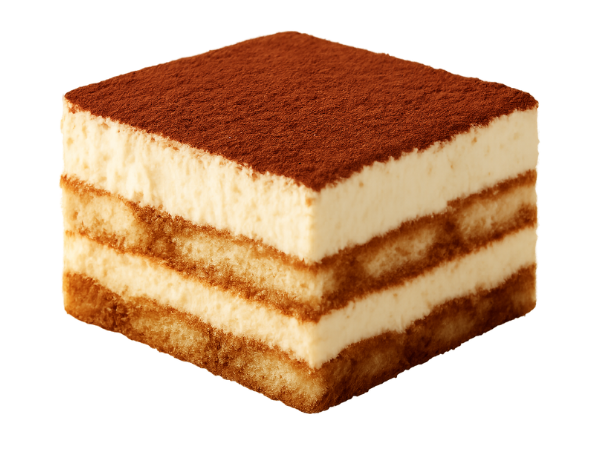
Tiramisu
Caffeine
35–45 mg
Note: Caffeine content in tiramisu depends on the type of coffee used, the recipe, and the portion size. Factors such as the strength of the espresso, the number of servings in the dessert, and the addition of ingredients like cocoa powder or coffee liqueur can all influence the final amount.
| Attribute | Value |
|---|---|
| Caffeine Level | Moderate |
| Serving Size | 120 g (medium slice) |
| Caffeine | 35–45 mg per slice |
| Caffeine per 100 g | 30–35 mg |
| Calories | 450 kcal |
| Sugar | 35–40 g |
Tiramisu is one of Italy’s most beloved desserts, known for its creamy layers and rich coffee flavor. But because it’s made with espresso or strong coffee, it naturally contains caffeine. For those who are sensitive to caffeine or simply curious, understanding how much is in each portion can help you enjoy tiramisu without surprises.
What Is Tiramisu?
Tiramisu is a layered Italian dessert that originated in the Veneto region in the 1960s. Its name translates to “pick me up,” a nod to both its energizing coffee base and indulgent sweetness. The caffeine in tiramisu comes primarily from the espresso used to soak the ladyfingers.
Key components of tiramisu include:
- Ladyfingers (Savoiardi): Sponge-like biscuits that absorb espresso.
- Espresso or Strong Coffee: The main source of caffeine in the dessert.
- Mascarpone Cream: A rich blend of mascarpone cheese, eggs, and sugar.
- Cocoa Powder or Chocolate: Adds flavor and a small amount of caffeine.
- Optional Liqueur: Marsala wine or coffee liqueur for depth of flavor.
Together, these ingredients create a dessert that is both decadent and lightly stimulating, thanks to its caffeine content.
Nutritional Facts of Tiramisu (Including Caffeine Content)
Tiramisu is not only about caffeine—it’s also a calorie-dense dessert with a mix of carbohydrates, fats, and proteins. The nutritional profile varies depending on the recipe, but a typical restaurant slice provides around 400–500 calories.
Here’s a breakdown of common nutritional elements per serving:
- Calories: 400–500 kcal
- Carbohydrates: 40–50 g
- Fat: 20–30 g
- Protein: 6–8 g
- Caffeine: 30–60 mg (depending on espresso strength and portion size)
While the caffeine amount is modest compared to a full cup of coffee (95 mg on average), it’s still enough to be noticeable for those sensitive to stimulants.
How Much Caffeine Is in Tiramisu by Serving Size?
The caffeine content in tiramisu depends on how much espresso is used and how large the portion is. A standard recipe typically uses ¼ to ½ cup of espresso, which is distributed across the whole dessert.
Approximate caffeine amounts by serving size:
- Small Slice (80 g): 25–30 mg
- Medium Slice (120 g): 35–45 mg
- Large Slice (150 g): 50–60 mg
- Whole Pan (8–10 servings): 250–400 mg total
This means a single slice of tiramisu has about the same caffeine as a cup of green tea, but less than a standard cup of coffee.
Caffeine in Tiramisu by Weight (Per 100g and Per Slice)
Looking at tiramisu by weight provides a clearer picture of its caffeine density. Since espresso is the main contributor, the more coffee-soaked ladyfingers in a portion, the higher the caffeine.
Here’s the approximate breakdown:
- Per 100 g of Tiramisu: 30–35 mg caffeine
- Per Average Slice (120 g): 35–45 mg caffeine
- Per Large Slice (150 g): 50–60 mg caffeine
These values can vary depending on whether the recipe uses single or double shots of espresso, or substitutes strong brewed coffee instead.
Who Should Be Mindful of Tiramisu’s Caffeine Content?
For most people, the caffeine in tiramisu is relatively low and unlikely to cause issues. However, certain groups may want to be cautious, especially if consuming tiramisu in the evening.
Those who should be mindful include:
- Children: Even small amounts of caffeine can affect sleep and behavior.
- Pregnant Individuals: Recommended daily caffeine intake should not exceed 200 mg.
- People Sensitive to Caffeine: May experience jitters or insomnia from even small doses.
- Those with Sleep Issues: Eating tiramisu late at night could interfere with rest.
In moderation, tiramisu is safe for most people, but being aware of its caffeine content helps you enjoy it at the right time of day.
